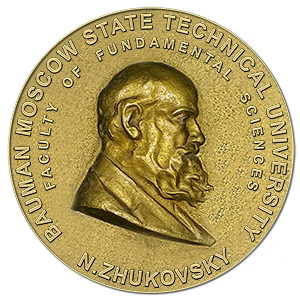|
Deparment |
Field of study (group of research specializations) |
Specialization |
Specifications |
|
FN-1 "Higher Mathematics" |
2.3 Information technology and telecommunications |
2.3.1 Systems analysis, data management and processing, statistics |
Formalization and formulation of problems involving systems analysis, optimization, management, decision-making, data processing and artificial intelligence |
|
1.2 Computer science and information science |
1.2.2 Mathematical modeling, numerical methods and software packages |
Development of novel mathematical methods and algorithms for validating mathematical models of objects based on either empirical data or analysis of mathematical models |
|
|
FN-2 "Applied Mathematics" |
1.2 Computer science and information science |
1.2.2 Mathematical modeling, numerical methods and software packages |
Development of novel mathematical methods for simulating objects and phenomena (in physical and mathematical sciences) |
|
FN-3 "Theoretical Mechanics" |
1.1. Mathematics and Mechanics |
1.1.7 Theoretical Mechanics, Dynamics of Machines |
Theory of oscillations of mechanical systems |
|
1.1. Mathematics and Mechanics |
1.1.9 Fluid, Gas and Plasma Mechanics |
Hydrostatics (fluids and gases at rest in equilibrium) |
|
|
FN-4 "Physics" |
1.1. Mathematics and Mechanics |
1.1.9 Fluid, Gas and Plasma Mechanics |
Laws of rheological behavior for homogeneous and multiphase fluid media subjected to mechanical loads and other effects |
|
1.3. Physical Science |
1.3.2. Instrumentation and methods of experimental physics |
Investigating physical phenomena and processes that may be used to develop innovative instrumentation and methods for experimental physics |
|
|
1.3.3. Theoretical Physics |
Classical and quantum field theory. Theory of fundamental interactions. The study of small-scale high-energy phenomena. Unified models of fundamental interactions. Development of mathematical methods for field theory. Supergravity and superstring theory, models with extra dimensions, AdS/CFT correspondence, holographic models |
||
|
1.3.6. Optics |
Further investigation of the physical foundations of wave optics, including the physics underlying such phenomena as interference, diffraction, polarization and light coherence |
||
|
1.3.8. Condensed Matter Physics |
Analytical and experimental investigation of the physical nature and properties of inorganic and organic compounds in both crystalline (mono- and polycrystalline) and amorphous states, including composites and heterostructures, as determined by their chemical and isotopic composition, temperature and pressure |
||
|
FN-5 "Chemistry" |
1.4. Chemical science |
1.4.4. Physical chemistry |
Combining experimental and analytical approaches to determining the parameters describing the energy and structural dynamics underlying the structure of molecules and molecular compounds, as well as the spectral characteristics of said molecules and compounds |
|
FN-11 "Computational Mathematics and Mathematical Physics" |
1.2 Computer science and information science |
1.2.2 Mathematical modeling, numerical methods and software packages |
Development of numerical modeling and simulation systems, algorithms and methods of simulation modeling based on the analysis of mathematical models (for engineering sciences) |
|
1.1. Mathematics and Mechanics |
1.1.8. Mechanics of deformable solids |
Laws of deformation, fault and failure evolution for materials, including natural, artificial and emergent ones |
|
|
FN-12 "Mathematical Modeling" |
1.2 Computer science and information science |
1.2.2 Mathematical modeling, numerical methods and software packages |
Development, validation and testing of efficient computational methods using modern computer technology |

